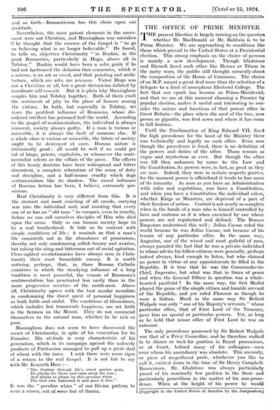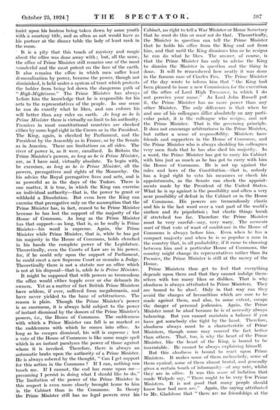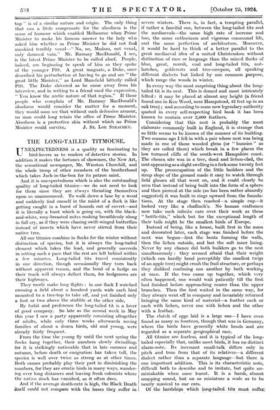THE OFFICE OF PRIME MINISTEIt. .
THE present Election is largely turning on the question whether Mr. MacDonald or Mr. Baldwin is to be Prime Minister. We are approaching to conditions like those which prevail in the United States at a Presidential election. This strong emphasis on the choice of persons is mainly, a new development. Though Gladstone and Disraeli faced each other like Heroes or Titans in the party wars, the public still thought earnestly about the composition of the House of Commons. The choice of an M.P. meant a great deal more than the selection of a delegate to a kind of amorphous Electoral College. The fact that our epoch has become so Prime-Ministerial, and that we are at this moment choosing a Premier by popular election, makes it useful and interesting to con- sider the nature and functions of that potent office in Great Britain—the place where the seed of the tree, now grown so gigantic, was first sown and where it has come to full fruition.
Until the Proclamation of King Edward VII. fixed the high precedence for the head of the Ministry there was technically and legally no such office. Even now though the precedence is fixed, there is no definition of the powers and duties of the office. Those remain as vague and mysterious as ever. But though the office was till then unknown by name to the Law and the Constitution, its powers were, in fact, as great as they are now. Indeed, they were in certain respects greater, for the moment power is officialized it tends to lose some of its intensity. As soon as- you have an Administration with rules and regulations, you have a Constitution, and when you have a Constitution the individual rulers, whether Kings or Ministers,- are deprived of a part of their freedom of action. Control is not nearly so complete when in the hands of a man who is himself controlled by laws and customs as it is when exercised by one whose powers are not regularized and defined.- The Roman Emperors understood this well ; Julius Caesar ruled the world because he was Julius Caesar, not because of his tenure of any particular office. In the same way, Augustus, one of the wisest and most guileful of men, always paraded the fact that he was a private individual to whose advice his fellow-citizens were generally, perhaps indeed always, kind enough to listen-, but who claimed no power in virtue of any appointments he filled in the Republic. It is true that he was the Commander-in- Chief, Imperator, but what was that in times of peace and when the General Officer in question was a whole- hearted pacificist ? In the same way, the first Medici played the game of the simple citizen and humble servant of the Republic, and yet ruled Florence as though he were a Sultan. Much in the same way Sir Robert Walpole was only "one of his Majesty's servants " whose particular office, that of First Lord of the Treasury, gave him no special or particular powers. Yet, as long as he held that minor office of First Lord he was an autocrat.
The only precedence possessed by Sir Robert Walpole was that of a Privy Councillor', and he therefore walked in to dinner or took his position in Royal processions, or at Court, behind many " of his colleagues—men over whom his ascendancy was absolute. This anomaly, or piece of magnificent pride, .whichever you like to call it, existed down to the time of Sir Henry Campbell- Bannerman. Mr. Gladstone was always particularly proud of his nominally low position in the State and particularly punctilious in the matter of his non-prece- dence. When at the height of his power he would
[Copyright in the Mated States of America by the /ndependentj
insist upon his hostess being taken down, by some youth with courtesi title, -an1. as often as not would have as his partner at the dinner table the lady of least rank in the room.
It is a pity that this touch of mystery and magic about the office was done away with ; but; all the same, the office of Prime Minister still remains one of the Most wonderful and the most potent on the face 'of the earth. It also remains the - office in Which men ' suffer least demoralization by power, because the power, though not diminished, is held under a system of trust which protects the holder from being led down the dangerous path of "High-Mightiness." The Prime Minister has always before him the knowledge that he is responsible for his acts to the representatives of the people. In one sense he can do exactly what he likes, and can enforce his will better than any ruler on earth. As long as he is Prime Minister there is virtually no limit to his authority. Premiers in most constitutional countries are checked either by some legal right in the Crown or in the President.
The King, again, is checked by Parliament, and the President by the Assembly as in France, or by the Senate as in America. There are limitations on all sides. The river of power is, as it were, canalized. In Britain the Prime Minister's powers, as long as he is Prime Minister, are, as I have said, virtually absolute. To begin with, he exercises, as long as he is Prime Minister, all the powers, prerogatives and rights of the Monarchy. On his advice the Royal prerogative lives and acts, and is as powerful as in the days of the Tudors. There is one matter, it is true, in which the King can exercise an individual authority—that is, the power to grant or withhold a Dissolution. But even here the King can exercise that prerogative only on the assumption that the Prime Minister has, in fact, ceased to be Prime Minister because he has lost the support of the majority of the House of Commons. As long as the Prime Minister has that support—as long, that is, as he really is Prime Nlinister—his word is supreme. Again, the Prime Minister while Prime Minister, that is, while he has got his majority in the House of Commons, holds clenched in his hands the complete power of the Legislature. Theoretically, even the Courts of Law are in his power, for, if he could rely upon the support of Parliament, he could erect a new Supreme Court or unmake a Judge. Theoretically there is not a statute nor an office which is not at his disposal—that is, while he is Prime Minister. It might be supposed that with powers so tremendous the office would either topple over or else debauch its owners. Yet as a matter of fact British Prime Ministers have seldom, if ever, suffered from megalomania, and have never yielded to the bane of arbitrariness. The reason is plain. Though the Prime Minister's power is so enormous, it is always held subject to the power of instant dismissal by the donors of the Prime Minister's powers, i.e., the House of Commons. The suddenness with which a Prime Minister can fall is as marked as the suddenness with which he comes into office. As long as he escapes dismissal, his will is supreme ; but a vote of the .House of Commons is like some magic spell 'which in an instant paralyses the power of those against whom it is invoked. Therefore, there is always an automatic brake upon the authority of a Prime Minister. He is always sobered by the thought, "Can I get support for this action in the Commons ? If I can, nothing can touch me. If I cannot, the end has come upon me— 'presuming I persist in doing what I should like to do." The limitation of the power of the Prime Minister in this respect is even more closely brought home to him in the Cabinet than in the Commons. In theory the Prime Minister still has no legal powers over his Cabinet, no right to tell a War Minister or Home Secretary that he must do this or must not do that. Theoretically, the Minister in question Can tell the Prime Minister that he holds his office from the King and not from him, and that 'until the King dismisses him or he 'resigns he can .do what he- likes. The answer, of course, is that the Prime Minister has only to advise the King to dismiss the Minister in 'question and the thing is done. It will be remembered how neatly it was done in the famous ease of Charles Fox. - The Prime Minister of the day wrote to inform him that "the King had been .pleased to issue a new Commission for the execution of the office of Lord High Treasurer, in which I do not perceive your name." As Lord John Russell put it, the Prime Minister has no More power than any other Minister. The only difference is that when he and one 'of his colleagues differ absolutely on any parti- cular point, it is the colleague who resigns, and not the Prime Minister. That is the governing principle. It does not encourage arbitrariness in the Prime Minister, but rather a' sense of responsibility. Ministers have friends and supporters in the House of Commons, and the Prime Minister who is always shedding his colleagues very Soon finds that he has also shed his majority. In a word, the Prime Minister has got to carry his Cabinet with him just as much as he has got to carry with him the House of Commons. He is not Up against the rules and laws of the Constitution—that is, nobody has a legal right to Veto his measures or cheek his appointments,- as the Senate can check the appoint- ments made by the President of the United States. What he is up against is the possibility and often a very near possibility of defeat in the Cabinet or in the House of Commons. His . powers are tremendously *elastic and his is the last word over a vast part of the world's Siirface and its 'population'; but elastic things break if stretched too far. Therefore the Prime Minister must be very careful—nay, very wary. The memento mori of that vote of want of confidence in the House of Commons is always before him. Even when he has a compact majority and when he is so popular a man in the country that, in all probability, if it came to choosing between him and a particular House of CoMmons, the country might change its representatives rather than its Premier, the Prime Minister is still at the mercy of the House.
Prime Ministers thus get to feel that everything depends 'upon them and that they cannot indulge them- selves with too many likes or dislikes. That is why aloofness is always attributed to Prime Ministers. They are bound to be aloof. Only in that way can they avoid the charges of favouritism which are sure to be made against them, and also, to some extent, escape the dander of personal jealousies. Again, the Prime Minister must be aloof because he is of necessity always balancing. But you cannot maintain a balance if you have got somebody else tight by the hand. Therefore, aloofness always must be a characteristic of Prime Ministers, though some may conceal the fact better than others. That, too, is why the heart of the Prime Minister, like the heart of the King, is bound to be inscrutable.. He cannot be always explaining hithself.
But this aloofness is bound to react upon Prime Ministers. It makes some of them melancholy, some of them cynical, some of them almost brutal, and generally gives a certain touch of inhumanity—at any rate, whilst they are in office. It was this sense of isolation that made Walpole say, "There ought to be very few Prime Ministers. It is not good that many people should know how bad men are." Again, the saying attributed to Mr. Gladstone that "there are no friendships at the top" is of a similar nature and origin. The only thing that can a little compensate for the aloofness is the sense of humour which enabled Melbourne when Prime Minister to make his famous answer to the lady who asked him whether as Prime Minister he did not find mankind terribly venal—" No, no, Madam, not venal, only damned vain." Mr. Ramsay MacDonald, I see, is the latest Prime Minister to be called aloof. People, indeed, are beginning to speak of him as they spoke of the younger Pitt. A great magnate, a Duke, once described his perturbation at having to go and see "the great little Minister," as Lord Mansfield bitterly called Pitt. The Duke shivered as he came away from his interview, and in writing to a friend used the expression, "You know the arctic nature of that region." If those people who complain of Mr. Ramsay MacDonald's aloofness would consider the matter for a moment, they would soon see that without such defensive armour, no man could long retain the office of Prime Minister. Aloofness is a protective skin without which no Prime




























































 Previous page
Previous page